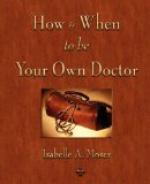4. Most people who are allergic to foods are allergic to one or more of the following: corn, wheat, milk and cheese, yogurt, meat, alcohol, tobacco. It would be very wise to eliminate these foods too for the first three days, until they are tested.
After three days on this regimen, you can assume that many of your usual allergic food reactions have ceased or at least diminished significantly and that you probably can get reasonably accurate testing results on individual foods. A good indicator of having problems with food allergies in general can also show up during these initial days. If you have eliminated a large number of foods and your resting pulse upon awakening has slowed down by several beats, you can assume you are allergic to foods you were eating.
I would not be at all surprised that by the end of the third day you were only eating a very few fruits and vegetables and had eliminated everything else. A more effective variant of the testing procedure calls for a three or four day water fast to clear all allergies with absolute certainty, and then to introduce foods one at a time as described below.
On the fourth and subsequent few days, take your resting pulse upon arising and then eat a modest quantity of a single food: for example, eat a slice of bread, or a medium sized glass of milk, or an orange, or two tablespoons sugar in dissolved in water, or a few dried prunes, or a peach, or an egg, or a medium-sized potato, or a cup of black coffee without sweetener, or a few ounces of meat, or a stick of celery, or half a cup of raw cabbage, or an onion, or a date, or a few hazelnuts, etc. Count the pulse one half hour later and again one hour after eating the test item.
If any food raises the resting pulse over 12 beats per minute above your morning resting pulse, that food should be eliminated; you are certainly allergic to it or can’t digest that much of it. If your pulse has not returned to its morning resting rate one hour later, you are still having an allergic reaction to the food you ate previously and cannot get a decent result on another food until either your pulse slows again or until the next morning. You may, however, continue to eat other foods that you know do not provoke allergic reactions. Because reactions to a food may not clear for many hours, it is wise to eat only small quantities of individual foods if you wish to test many of them in a single day. If a food causes no acceleration of pulse (at least 6 beats above your estimated normal maximal) that food can be tentatively labeled non-allergenic.




